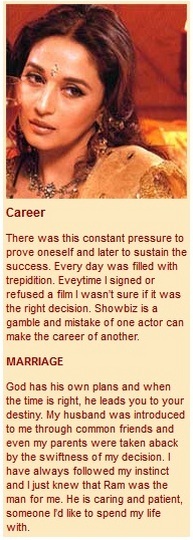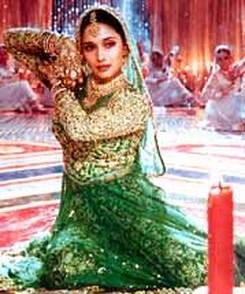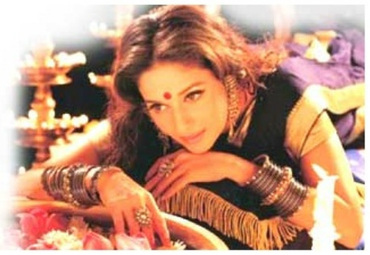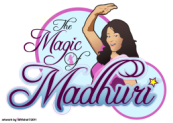“Don’t sit so far away, it’s like talking on a long distance line...” Madhuri Dixit had joked when I dropped by at her residence two years ago. Today, the only communication possible with the actress is a long distance call and strangely, it’s not in the least bit uncomfortable. It’s early morning in Florida and Madhuri is buzzing with her morning routine in her cosy apartment. In Mumbai, it’s late evening and I’m getting ready to retire for the day. It’s May 15, Madhuri’s birthday and there are recurring interruptions, but Dixit picks up the threads of our conversation with characteristic patience and professionalism.
Are you having a big bash for your birthday?
No, I don’t enjoy big bashes. But yes, we are having a quiet dinner in the evening with friends. Actually, the last few weeks have been too hectic. We’ve been travelling particularly every weekend. Now my husband and I are looking forward to spending some time at home.
You were recently in UK for the Selfridges show, what was it like?
Quite revelatory. The event is a great platform for Indian films. Suddenly, there is a lot of curiosity amongst the West for Asian films. This has happened after Lagaan making it to the Oscars. It’s great news and reason enough for celebration.
The show is meant to open new markets for Hindi cinema in the global context. What are your views?
What’s heartening is that this is the first time that the West is drawn to Indian mainstream cinema. All along, the representation was from the experimental films. That’s changing. At last, everyone is accepting that there is quality in commercial cinema too. This is a good sign. Acknowledgement will assure responsibility, both for the filmmakers as well as for the artistes.
Are you having a big bash for your birthday?
No, I don’t enjoy big bashes. But yes, we are having a quiet dinner in the evening with friends. Actually, the last few weeks have been too hectic. We’ve been travelling particularly every weekend. Now my husband and I are looking forward to spending some time at home.
You were recently in UK for the Selfridges show, what was it like?
Quite revelatory. The event is a great platform for Indian films. Suddenly, there is a lot of curiosity amongst the West for Asian films. This has happened after Lagaan making it to the Oscars. It’s great news and reason enough for celebration.
The show is meant to open new markets for Hindi cinema in the global context. What are your views?
What’s heartening is that this is the first time that the West is drawn to Indian mainstream cinema. All along, the representation was from the experimental films. That’s changing. At last, everyone is accepting that there is quality in commercial cinema too. This is a good sign. Acknowledgement will assure responsibility, both for the filmmakers as well as for the artistes.

How responsible do you feel as a brand ambassador for your beauty products?
Emami as you know is a herbal products range for skin and haircare. There is global interest right now in herbs and horticulture healing. It’s a killer market with cut-throat competition, but the manufacturers are confident of reaching out to a wider audience via the Asians settled abroad. I feel morally and commercially responsible for all my commitments and am giving it my best shot. Finally, of course, the product has to be good to become popular.
How would you analyse your last few releases?
Lajja was a satisfactory experience. Not just for me but for all of us involved in the film, I think. And that’s apparent in the final product. I look back on my role and the message of the film with a lot of pride.
And your forthcoming films?
Well, Hum Tumhare Hain Sanam has taken a long time, but there is a refreshing angle to the story. Unlike what everyone thinks, it isn’t a love story but offers new insights into marriage. Shah Rukh plays a husband who cannot express himself. I play an archetypal wife who is oblivious of her husband’s need for romance. Salman is my childhood friend who wants to share everything that goes on in his life and in the bargain oversteps, creates chaos in his friend’s marital life.
If a similar situation were to occur in real life would you be able to deal with it?
I’d hate to believe that something like that can happen in my life. I’m optimistic by nature and believe that if there is basic trust and confidence in a relationship, if one can communicate, there would be no problems. However, this is a hypothetical question and human beings never know what they can deal with unless faced with a crisis. The same with accomplishments, you never know your true mettle until you’re faced with challenges.
Shah Rukh and you exude a special chemistry on screen. How would you describe your relationship with him?
We are comfortable as co-stars and there is mutual affection for each other which probably filters in our scenes. He is naughty and I’m watchful of his pranks, but there is a healthy give and take of ideas as well. Acting isn’t about competition but making a scene work. This isn’t possible without camradarie amongst actors. The audience must be able to identiy with what’s happening to the characters on screen.
Do filmmakers usually have a convincing theory on why they offer you a particular role?
Conscientious directors do because they love their scripts more than anyone else and cannot bear to see anything going wrong with their projection. In certain films, the roles are such that it doesn’t matter who plays which role, in which case when the director offers you a choice, he isn’t being insincere.
What was Sanjay Leela Bhansali’s explanation in offering you Chandramukhi and not Paro in Devdas?
I think Sanjay was very upfront. He said the film had two roles but he’d like me to play Chandramukhi because that’s how he sees me. His explanation being that my knowledge of dancing and abhinaya would be more appropriate for the character. I agreed because I trust his judgement.
If you had the choice would you have preferred to play Paro?
I don’t think so because I’ve played shades of Paro in my earlier films. The only difference being that the character wasn’t set in a period film. In contrast, I’ve never played a courtesan.
Chandramukhi’s character has a graph of emotions. In her devotion for the man, she literally transforms from a tawaif to jogan, which I find very attractive.
As an individual, which of the two (Paro/Chandramukhi) do you identify with?
That’s a tough one to answer but let me try. Paro was ahead of her times, but in today’s context she seems perfectly reasonable. I’m not sure if it is all that easy to love as selflessly as Chandramukhi did. She made too many sacrifices and assumed responsibility for someone who never loved her in return. That can be very daunting and painful. It all sounds so remote and impractical today.
So how did you research for a role so far fetched?
In this case what helped was the director’s projection of the character. Bhansali views Chandramukhi as an extension of Meera whose love for Krishna remained unrequited till the end. That’s the emotional part. For physical expression, there were the kathak dances, the elaborate costumes and the magnificent sets. It was literally like living off a fantasy. When I walked on to the sets, I actually felt the part.
Is there some trick actors resort to when creating characters?
Such a formula does not exist. Most of the time actors follow their instinct. Sometimes, the director provides the subtext as in the case of Devdas. The trick, if at all there is one, is to let the real person withdraw and the role take over. The process happens so quietly that no one except the performer notices it. And of course the director. That’s because he is the only one who has seen the film in his head before actually making it.
You’ve also sung a song in the film.
They are just a few lines and you can hardly call it singing. They call it kavita or chand, still it was a thrilling experience.
Now that you are training as a singer would you say singing is easier than acting?
I think nothing is easy. Besides, I’m hardly in a position to draw comparisons between the two. I was fortunate to grow up in an atmosphere where I saw my mother sing. Ever since I can remember our home reverberated with ragaas every morning. May be that’s why I’m so appreciative of music, of the purity of Lata Mangeshkar’s voice, of Asha Bhosle’s vivacity and Alka Yagnik’s prolificity.
Emami as you know is a herbal products range for skin and haircare. There is global interest right now in herbs and horticulture healing. It’s a killer market with cut-throat competition, but the manufacturers are confident of reaching out to a wider audience via the Asians settled abroad. I feel morally and commercially responsible for all my commitments and am giving it my best shot. Finally, of course, the product has to be good to become popular.
How would you analyse your last few releases?
Lajja was a satisfactory experience. Not just for me but for all of us involved in the film, I think. And that’s apparent in the final product. I look back on my role and the message of the film with a lot of pride.
And your forthcoming films?
Well, Hum Tumhare Hain Sanam has taken a long time, but there is a refreshing angle to the story. Unlike what everyone thinks, it isn’t a love story but offers new insights into marriage. Shah Rukh plays a husband who cannot express himself. I play an archetypal wife who is oblivious of her husband’s need for romance. Salman is my childhood friend who wants to share everything that goes on in his life and in the bargain oversteps, creates chaos in his friend’s marital life.
If a similar situation were to occur in real life would you be able to deal with it?
I’d hate to believe that something like that can happen in my life. I’m optimistic by nature and believe that if there is basic trust and confidence in a relationship, if one can communicate, there would be no problems. However, this is a hypothetical question and human beings never know what they can deal with unless faced with a crisis. The same with accomplishments, you never know your true mettle until you’re faced with challenges.
Shah Rukh and you exude a special chemistry on screen. How would you describe your relationship with him?
We are comfortable as co-stars and there is mutual affection for each other which probably filters in our scenes. He is naughty and I’m watchful of his pranks, but there is a healthy give and take of ideas as well. Acting isn’t about competition but making a scene work. This isn’t possible without camradarie amongst actors. The audience must be able to identiy with what’s happening to the characters on screen.
Do filmmakers usually have a convincing theory on why they offer you a particular role?
Conscientious directors do because they love their scripts more than anyone else and cannot bear to see anything going wrong with their projection. In certain films, the roles are such that it doesn’t matter who plays which role, in which case when the director offers you a choice, he isn’t being insincere.
What was Sanjay Leela Bhansali’s explanation in offering you Chandramukhi and not Paro in Devdas?
I think Sanjay was very upfront. He said the film had two roles but he’d like me to play Chandramukhi because that’s how he sees me. His explanation being that my knowledge of dancing and abhinaya would be more appropriate for the character. I agreed because I trust his judgement.
If you had the choice would you have preferred to play Paro?
I don’t think so because I’ve played shades of Paro in my earlier films. The only difference being that the character wasn’t set in a period film. In contrast, I’ve never played a courtesan.
Chandramukhi’s character has a graph of emotions. In her devotion for the man, she literally transforms from a tawaif to jogan, which I find very attractive.
As an individual, which of the two (Paro/Chandramukhi) do you identify with?
That’s a tough one to answer but let me try. Paro was ahead of her times, but in today’s context she seems perfectly reasonable. I’m not sure if it is all that easy to love as selflessly as Chandramukhi did. She made too many sacrifices and assumed responsibility for someone who never loved her in return. That can be very daunting and painful. It all sounds so remote and impractical today.
So how did you research for a role so far fetched?
In this case what helped was the director’s projection of the character. Bhansali views Chandramukhi as an extension of Meera whose love for Krishna remained unrequited till the end. That’s the emotional part. For physical expression, there were the kathak dances, the elaborate costumes and the magnificent sets. It was literally like living off a fantasy. When I walked on to the sets, I actually felt the part.
Is there some trick actors resort to when creating characters?
Such a formula does not exist. Most of the time actors follow their instinct. Sometimes, the director provides the subtext as in the case of Devdas. The trick, if at all there is one, is to let the real person withdraw and the role take over. The process happens so quietly that no one except the performer notices it. And of course the director. That’s because he is the only one who has seen the film in his head before actually making it.
You’ve also sung a song in the film.
They are just a few lines and you can hardly call it singing. They call it kavita or chand, still it was a thrilling experience.
Now that you are training as a singer would you say singing is easier than acting?
I think nothing is easy. Besides, I’m hardly in a position to draw comparisons between the two. I was fortunate to grow up in an atmosphere where I saw my mother sing. Ever since I can remember our home reverberated with ragaas every morning. May be that’s why I’m so appreciative of music, of the purity of Lata Mangeshkar’s voice, of Asha Bhosle’s vivacity and Alka Yagnik’s prolificity.

Some years ago, you seemed completely detached from your contemporaries.
That’s not true. Progress of art in any form is appealing to me. Maybe I didn’t articulate my appreciation. But then I’m not demonstrative by nature. Also, when you are in the limelight, everything you say and do has a risk of being misinterpreted. That’s the price of stardom and as a safety measure, you make it a habit to become discreet. Now I understand why most successful stars are described as reserved. It’s more out of self preservation than temperament.
After all these years what are the changes you see in yourself?
Those close to me say that I’ve become more talkative now. I feel I’ve become more expressive about my feelings. Perhaps, I was like this in childhood and then changed over the years. I’m not sure. Perhaps, in the last few years I was so busy working that there was never any time for communicating. Anyway, I like my new self so does my family.
How has your family adjusted to your flying visits to India?
They miss me and I miss them tremendously becuase we are so used to being with each other. We talk a number of times a day and I am always thinking of what they would be doing at a certain time of the day, just as they think of me time and again. But on the whole they are like a retired couple happy that all their children are well-settled. I’m really fortunate to have such special parents. They’ve sacrificed so much for me. My career demanded keeping crazy schedules but they never complained. I can never repay their affection.
What about your adjustment in your new home? Have you made friends with the city?
Yeh, initially I was scared but if you have the desire and are ready to push yourself to your optimum level, you can do it. I was frightened to drive, to cook but I’ve made friends with the gadgets and their knobs and the alien roads. In fact, now I shop at the local supermarket, carry lunch to my husband at the hospital, browse in the shops, you can say I’m rocking. What finally matters is happiness in personal life and I have found that in my partner and my dwelling place.
Bhawana Somaaya
Source: Screen India (May 2002)
That’s not true. Progress of art in any form is appealing to me. Maybe I didn’t articulate my appreciation. But then I’m not demonstrative by nature. Also, when you are in the limelight, everything you say and do has a risk of being misinterpreted. That’s the price of stardom and as a safety measure, you make it a habit to become discreet. Now I understand why most successful stars are described as reserved. It’s more out of self preservation than temperament.
After all these years what are the changes you see in yourself?
Those close to me say that I’ve become more talkative now. I feel I’ve become more expressive about my feelings. Perhaps, I was like this in childhood and then changed over the years. I’m not sure. Perhaps, in the last few years I was so busy working that there was never any time for communicating. Anyway, I like my new self so does my family.
How has your family adjusted to your flying visits to India?
They miss me and I miss them tremendously becuase we are so used to being with each other. We talk a number of times a day and I am always thinking of what they would be doing at a certain time of the day, just as they think of me time and again. But on the whole they are like a retired couple happy that all their children are well-settled. I’m really fortunate to have such special parents. They’ve sacrificed so much for me. My career demanded keeping crazy schedules but they never complained. I can never repay their affection.
What about your adjustment in your new home? Have you made friends with the city?
Yeh, initially I was scared but if you have the desire and are ready to push yourself to your optimum level, you can do it. I was frightened to drive, to cook but I’ve made friends with the gadgets and their knobs and the alien roads. In fact, now I shop at the local supermarket, carry lunch to my husband at the hospital, browse in the shops, you can say I’m rocking. What finally matters is happiness in personal life and I have found that in my partner and my dwelling place.
Bhawana Somaaya
Source: Screen India (May 2002)


 RSS Feed
RSS Feed